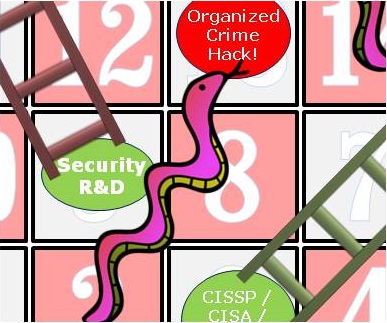From Information Security to Digital Competitiveness: Exploring new strategic opportunities for CIOs and CISOs.
The rise of digital presents an opportunity for the Chief Information Security Officer to move from a purely defensive position to one which uses the organization's information to act strategically and drive business value.
For as long as we've had a distinct information security profession, it has been said that security needs to be a "business enabler". But what exactly does that mean? How can security professionals advance from their inherently defensive postures, into more strategic positions, and contribute actively to the growth of the business? This is the focus of my latest work at Constellation Research. It turns out that security professionals have special tools and skills ideally suited to a broader strategic role in information management.
The role of Chief Information Security Officer (CISO) is a tough one. Security is red hot. Not a week goes by without news of another security breach.
Information now is the lifeblood of most organisations; CISOs and their teams are obviously crucial in safeguarding that. But a purely defensive mission seldom allows for much creativity, or a positive reputation amongst one's peers. A predominantly reactive work mode -- as important as it is from day to day -- can sometimes seem precarious. The good news for CISOs' career security and job satisfaction is they happen to have special latent skills to innovate and build out those most important digital assets.
Information assets are almost endless: accounts, ledgers and other legal records, sales performance, stock lists, business plans, R&D plans, product designs, market analyses and forecasts, customer data, employee files, audit reports, patent specifications and trade secrets. But what is it about all this information that actually needs protecting? What exactly makes any data valuable? These questions take us into the mind of the CISO.
Read the research report Strategic Opportunities for CISOs in a Digital Age
Security management is formally all about the right balance of Confidentiality, Integrity and Availability in the context of the business. Different businesses have different needs in these three dimensions.
Think of the famous industrial secrets like the recipes for KFC or Coca Cola. These demand the utmost confidentiality and integrity but the availability of the information can be low (nay, must be low) because it is accessed as a whole so seldomly. Medical records too have traditionally needed confidentiality more than availability, but that's changing. Complex modern healthcare demands electronic records, and these do need high availability especially in emergency care settings.
In contrast, for public information like stock prices there is no value in confidentiality whatsoever, and instead, availability and integrity are paramount. On the other hand, market-sensitive information that listed companies periodically report to stock exchanges must have very strict confidentiality for a relatively brief period.
Security professionals routinely compile Information Asset Inventories and plan for appropriate C-I-A for each type of data held. From there, a Threat & Risk Assessment (TRA) is generally undertaken, to examine the adverse events that might compromise the Confidentiality, Integrity and/or Availability. The likelihood and the impact of each adverse event are estimated and multiplied together to gauge the practical risk posed by each known threat. By prioritising counter-measures for the identified threats, in line with the organisation's risk appetite, the TRA helps guide a rational program of investment in security.
Now their practical experience can put CISOs in a special position to enhance their organisation's information assets rather than restrict themselves to hardening information against just the negative impacts.
Here's where the CISO's mindset comes into play in a new way. The real value of information lies not so much in the data itself as in its qualities. Remember the cynical old saw "It's not what you know, it's who you know". There's a serious side to the saying, which highlights that really useful information has pedigree.
So the real action is in the metadata; that is, data about data. It may have got a bad rap recently thanks to surveillance scandals, but various thinkers have long promoted the importance of metadata. For example, back in the 1980s, Citibank CEO Walter Wriston famously said "information about money will become almost as important as money itself". What a visionary endorsement of metadata!
The important latent skill I want to draw out for CISOs is their practiced ability to deal with the qualities of data. To bring greater value to the business, CISOs can start thinking about the broader pedigree of data and not merely its security qualities. They should spread their wings beyond C-I-A, to evaluate all sorts of extra dimensions, like completeness, reliability, originality, currency, privacy, and regulatory compliance.
The core strategic questions for the modern CISO are these:
- What is it about your corporate information that gives you competitive advantage?
- And what exactly makes your information valuable?
The CISO has the mindset and the analytical tools to surface these key questions in the C-suite and positively engage their executive peers in finding the answers. By applying their skills to map out all the value-creating qualities of enterprise data, the CISO can build a comprehensive "Enterprise Information Catalog" (thanks to Troy Braban at Australia Post for that term!) and grow into a broader, more strategic Chief Data Officer style of role. The future of the CISO is to shift from purely defensive security modus opeandi to take on responsibility for the pedigree and competitiveness of enterprise information.
Read my research report Strategic Opportunities for CISOs in a Digital Age for more information.


